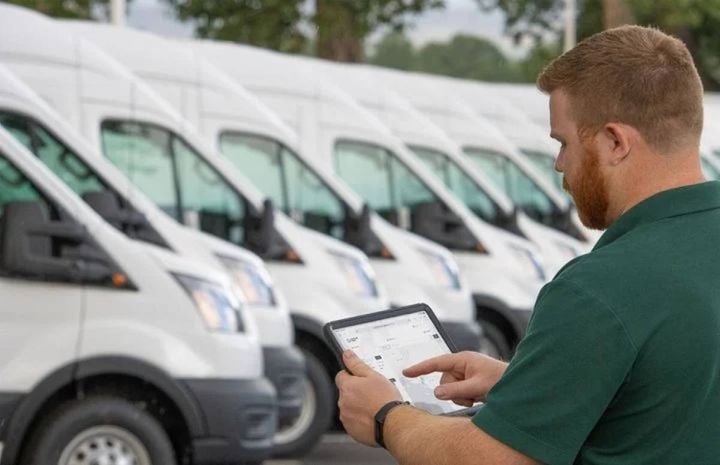
Telematics data such as odometer readings, vehicle locations, and accurate fuel levels are essential for fleet operators to optimize their operations and increase profits.
Photo: Lightning eMotors
Large, multi-national rental car agencies have recognized the value of a connected fleet for several years.
The same cost-saving and revenue-generating use cases can work for all rental operators, regardless of size.
The value proposition of telematics to franchise operators runs the full cycle of the vehicle rental process.
Using data can have an immediate return on investment from rent start to rent finish, as well as during the prep stage for the next rental.
Value also runs across the rental agency business. Telematics data such as odometer readings, vehicle locations, and accurate fuel levels are essential for rental car fleet operators to optimize their operations and increase profits.
We’ll look at some obvious use cases, a couple of not-so-obvious ones, and the estimated ROI of each.
Use Cases for Rental Operators
Vehicle Location/GPS
Vehicle location enables operators to track the whereabouts of each vehicle and assign them to customers based on proximity and availability, saving time and fuel cost. Real-time vehicle location supports business operations and customer experience.
GPS enables geofencing – a feature that allows operators to set boundaries for each vehicle and receive alerts when a vehicle enters or exits a predefined area, preventing unauthorized use or theft. Stolen vehicle recovery is a service that helps operators locate and recover a stolen vehicle, minimizing losses and insurance claims.
Key benefits:
- Immediate close-of-contract upon vehicle return to office
- Notification of usage violation (state or national boundaries)
- Respond to customer collisions, breakdowns, or repair
- Stolen or abandoned vehicle recovery
- Optimize vehicle cycling, and maximize uptime and readiness
- ROI: $2-$100 per vehicle per month

Geotab’s Rob Minton details five common use cases for fleet telematics data.
Photo: Geotab
Real-Time Odometer Reading
Odometer reading allows operators to monitor the mileage of each vehicle and schedule timely maintenance and repairs, reducing breakdowns and improving customer satisfaction. It also allows the operator to avoid excessive mileage that could affect the full remarketing value.
Key benefits:
- Removes need to retrieve odometer value by employee
- Current vehicle and fleet residual value tracking
- Inform scheduled maintenance
- ROI: $2 per vehicle per month
Fuel Used by Customer
Accurate fuel levels help operators charge customers the exact amount of fuel used for final billing and avoid disputes or fraud, enhancing customer loyalty and trust.
Key benefits:
- Additional revenue from fuel recoveries
- High-resolution fuel level reporting
- Removes the need to retrieve value by employees
- ROI: $8 per vehicle per month
Engine Fault Codes
Real-time notification of engine fault codes and messages from the vehicle help an operator prioritize repairs with remote diagnostic reports. No one wants to rent a car with the check engine light on.
Key benefits:
- Response planning and service prioritization
- Maximize uptime and longer vehicle lifecycle
- ROI: $2 per vehicle per month
Collision Detection
Collision detection is a function that detects and reports a collision involving a vehicle, enabling operators to respond quickly and assist the customer, reducing liability and damage costs.
It includes automated notification of a possible vehicle collision — key-on and key-off. It can also inform the operator of minor damages that may have gone unnoticed but are collectible.
Key benefits:
- Timely notification of collisions
- Quick response and outreach to customers to confirm their safety
- Mild, moderate, and severe collision detection
- Minimize unreported vehicle collision and abuse damages
- ROI: $25 per vehicle per month
The benefits of telematics data far exceed the cost of the service for any size rental operator and are affordable and scalable for any fleet size. Vehicle data can help operators improve efficiency, safety, customer service and profitability.
Rob Minton is the associate vice president of Geotab.
